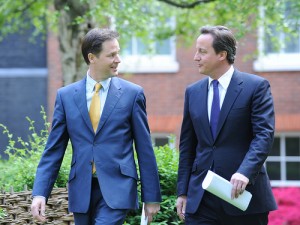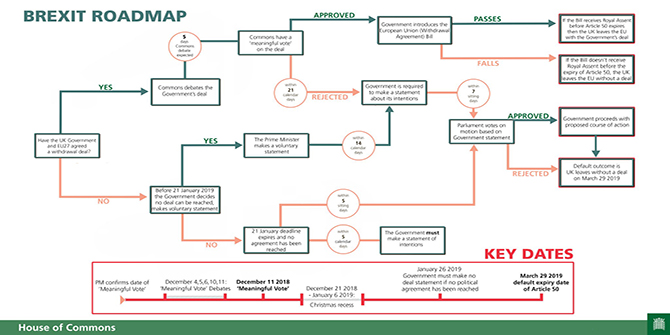 All coalitions unzip from the end, unless the date of their termination remains uncertain. But with last year’s Fixed Term Parliaments Act the Liberal Democrats cling to the illusion that they have statutory protection against any Conservative decision to ‘cut and run’ for an early general election, before the spring of 2015. Not so, argues Patrick Dunleavy. Britain’s next general election will happen in June 2014, catching the coalition’s junior partners on the hop.
All coalitions unzip from the end, unless the date of their termination remains uncertain. But with last year’s Fixed Term Parliaments Act the Liberal Democrats cling to the illusion that they have statutory protection against any Conservative decision to ‘cut and run’ for an early general election, before the spring of 2015. Not so, argues Patrick Dunleavy. Britain’s next general election will happen in June 2014, catching the coalition’s junior partners on the hop.
The term of this Parliament has passed an invisible but magically potent half-way mark. We now have two years to go to the start of the UK’s next general election campaign in May or June 2014. I am now 90 per cent sure that Britain will go the polls again fully a year ahead of the ‘official’ date for Conservative and Liberal Democrat co-operation to wrap up (supposedly May 2015).
Forecasting the future in political life is a mugs game at the best of times. The opportunities for falling flat on your face are legion, and the chances of actually being prophetic are tiny. So most social scientists consequently eschew anything that smacks of ‘futurology’. Yet the timing of the next general election is an important matter. Billions of pounds may hang on it for the City of London’s financial markets. And in the second half of a Parliament it behoves all MPs, government departments, party activists and citizens to calibrate their behaviours with an accurate view of when the next election will happen. So a half-time assessment could be useful, however risky.

At first sight, times have changed fundamentally in British politics on when general elections happen. Four year terms have been the norm for all but one UK government dating back to 1979. And no Prime Minister has gone to the polls outside of May or June (when the sun shines and voters feel better) since October 1974. Yet in 2011 the Fixed Term Parliaments Act was passed by the built-in Conservative and Liberal Democrat majorities in the Commons and the Lords, requiring that all Parliaments from now on last for the full term of five years.
Liberal Democrats are convinced that this particular stable door is firmly locked, and that there is now no way that the Tories can ‘cut and run’ – whether through David Cameron ‘betraying’ his commitments to Clegg in order to seize a poll advantage, or because of a putsch or demarche by the Tory right forcing the Prime Minister’s hand. They believe that Clegg has accomplished a fundamental constitutional change, achieving a cast iron guarantee of remaining Deputy PM until the spring of 2015. And, ironically, if the current government was single party majority government, the five year rule really would indeed be binding.
Yet the incontestable evidence of all coalition theory is that every coalition (without exceptions) tends to unzip from the end. If two actors A and B are in coalition and co-operating, but they know that the coalition is going to end at time T, then it makes sense for one actor (say A) to defect from co-operation in the time period just before the designated end, that is, at time T minus 1. At this point, because the end is nigh A should rationally take advantage of B in the final round – she has nothing to lose and everything to gain by doing so. Yet actor B (perhaps having studied public choice theory at LSE) knows that this temptation is too strong for A to resist, so B too should plan to defect at T minus 1, meaning that co-operation is bound to close early. But now both actors know for sure that the end date of their coalition will certainly be T minus 1, so one or the other of them should surely reason through – ‘Why not defect at time T minus 2?’
And so the logic of unzipping goes on. The only circumstances where co-operation in any coalition will continue is when the end is uncertain or unforeseeable. Only then will both actors still hope to reap the gains to be had from co-operation, and fear to incur avoidable losses if they defect too early, getting punished for it by the other (betrayed) actor playing tit-for-tat. Explaining this to senior Liberal Democrats I see flutters of unease cross their faces, and sometimes get a reaction that perhaps the election might be two or three months early, but still it will surely be in 2015.
The flaw in the Act
Writing on this blog recently, Mark Pack – an unbelievably smart and well-informed analyst of the Westminster and Liberal Democrat scene – did none the less concede that:
‘The ‘fixed’ part of the new rules is pretty fixed, but not completely set fast in legislative Araldite… there are caveats for cases where there is either wide cross-party agreement or no one can form a government.
The House of Commons can vote for an early election – but the number of votes ‘for’ must be equal to or greater than two thirds of the number of seats in the House (including vacant seats). That means 217 votes are guaranteed to block an early election. Both Labour and the Tories have more than 217 votes, so an early election under this caveat can only happen if both major parties agree. Forget the idea that Cameron might face a politically bountiful time and try to cut and run for an early election – if the timing is good for the Conservatives, it would be bad for Labour, meaning Labour could and would block it’.
… An early election also happens if the House of Commons passes a vote of no confidence in the government (by a simple majority) and then fails within fourteen days to pass a motion of confidence in a new government’.
Yet the Act is not the waterproof requirement that the Liberal Democrats believe it is. In fact, the scenario for a radically early general election in 2014 is the simple one in bold in the quotation above – the possibility that Pack dismisses as infeasible, where the Conservatives want to call an early general election to reap a polling advantage while they can. Labour will block that for sure he says.
But will it? Imagine that in January/February 2014 David Cameron takes a look at the polls, and talks to George Osborne about the economic prospects and the budget. With press speculation already beginning to build, he privately resolves to step down as Prime Minister in May that year. Accordingly the budget is loaded up with immediate tax cuts and other goodies for voters. The unveiling of the Chancellor’s budget in March 2014 of course gives the game away.
But what can Nick Clegg do now but grin and bear it? If he picks a fight, then Cameron can announce that he is stepping down because of irreconcilable differences. If Clegg stays quiet, the tax cuts happen, the pre-election boom builds, the press speculation escalates into overdrive, and in April Cameron announces that to end damaging uncertainty, the ‘National Interest’ requires him to resign. We must now give UK voters the chance, he will say, to elect a Conservative government with a secure majority, that alone can bring prosperity back to Britain.
If the Conservatives are calling for an early general election in May 2014 then can Labour (ever) stand out against that? At all times Miliband must look as if he really wants a general election, and is raring to go at any moment. Labour certainly has no reason at all to look as if it wants to lend a politically toxic Nick Clegg any kind of hand. And while sitting in the Cabinet Room at 10 Downing Street once again may seem immediately attractive, Miliband has very, very few incentives to agree to run a risky and lame duck minority government for ten months, with or without Liberal Democrat ministers.
So if the Conservatives want an election, and Labour wants an election, an election is absolutely certain to happen. To bring it about it is only necessary for Cameron to resign as PM, forcing Labour to go through the motions of trying to form a maximum one-year administration with Liberal Democrat backing. For form’s sake, because the law requires it, and because it will give him endless TV coverage, Miliband will agree to negotiate for several days on some form of agreement (perhaps not with Clegg though). But then his team will say that it’s clearly impossible. The Liberal Democrats are untrustworthy and right wing, and there is no realistic agenda to get anything done. The ‘National Interest’ is calling Miliband too to go for a Labour government with a clear majority. And with that, fixed term Parliaments are toast and a general election is called at the normal 4 year time, that could mean (indeed is almost certain to mean) maximum disaster for the Liberal Democrats.
Just as happened with the AV campaign in spring 2011, Liberal Democrat ministers in 2014 will be stunned by the virulence of the Conservative electioneering; by the opportunistic way in which they are pilloried by Tory ministers and the Conservative newspapers for every government failing; by the shamelessness with which all Tory bridges to future co-operation are apparently burned; by the extent to which rampant Euroscepticism and populist causes are exploited in Conservative campaigning; and, on election night, by the radical way in which the cohort of Liberal Democrat MPs in the Commons is eviscerated.
What could still stop this ending? By early 2014, only an economic situation so poor and a Conservative poll rating so low that David Cameron cannot risk any election. Instead he would be locked inDowning Streetto the bitter end, hoping against hope that some good news will turn up. With the PM probably facing a divided Tory party (like John Major in his final year before him), a 2015 election would be a train wreck alternative for the Liberal Democrats also.
Please read our comments policy before posting








An interesting analysis, but there are couple of errors of fact in here:
Surely three out of the last seven general elections have been held after five year terms (1992, 1997 and 2010) so four years is not the norm.
Secondly, the date of the European elections is not in the control of the UK government, it is fixed by European law and can be varied by unanimous decision of the Council of Ministers. Subject to the outcome of formal consultation with the EP, it is currently intending to move the date to 22 May 2014. The UK order is just a formality.
You make a very good point here Michael, especially in pointing out the continued challenge to the Conservatives from parties to their right (UKIP especially at present, but the BNP also). Contemporary UK general elections are inherently multi-party contests.
If you go to the electoral Commission website and click on the question ‘When will the next European Parliamentary elections be held?’ you get the following, interestingly vague answer: ‘The next European Parliamentary elections are expected to be held in 2014, but the date won’t be confirmed until an order from the Secretary of State is made’.
What this signifies is that the current government can monkey around with the date of the European Parliament election to some extent. The key option open for Cameron and Theresa May (or her Tory successor) will be
– either to stick with a fixed date for the Euro election in the first week of June and go for a general election in early May 2014, thereby marginalizing the later Euro poll;
– or alternatively to hold the general election in late May or first week of June 2014, and hold the Euro election on the same day, as has happened before.
There are also local elections due in May (as there are every year) and they too could be pulled onto the same day as the general election, whatever year it is held. But if Cameron was unsure of what Tory support was like on the ground, and wanted to read the runes in detail, then letting the local elections go ahead on Thursday 1 May 2014 would make sense, allowing for a combined general and Euro election to be called for 5 June, or possibly 12 June.
A further point to add is that 2014 is the date for European elections too. This will almost certainly influence any decision.
If there is a resugent UKIP this could affect the Conservative vote and potential for achieving a majority in the Westminster polls as Tory vote could splinter off somewhat. This might point to 2015 as being safer for the Tories.